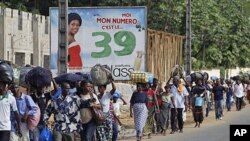People in Ivory Coast are feeling the effects of the country's political crisis, with signs of a gasoline shortage and the closure of eight daily newspapers.
The owners of the independent newspapers released a joint statement Tuesday citing ongoing "judicial and police harassment" by supporters of incumbent president Laurent Gbagbo. The dailies claim they are being targeted for refusing to back Mr. Gbagbo.
The incumbent president is defying international pressure to step down and cede power to Alassane Ouattara, whom most countries recognize as the winner of a November presidential election.
In a statement Tuesday, the media rights group Reporters Without Borders said privately-owned newspapers are being "hounded and threatened." The group also said a media war has broken out between pro-Gbagbo and pro-Ouattara supporters - creating what it called an "impossible situation for the press."
The group reported that attackers wielding clubs and machetes killed an employee for a pro-Gbagbo daily newspaper in southern Abidjan on Monday.
In another development, Mr. Gbagbo's government has banned residents from filling jerricans with gasoline. Mr. Gbagbo's mines minister announced the ban on Monday, prompting a rush to stockpile fuel.
The European Union has frozen the assets of Ivory Coast's port and its state oil firm to pressure Mr. Gbagbo to transfer power.
Meanwhile, fighting in the main city of Abidjan appeared to have subsided on Tuesday, after six straight days of violence between pro-Gbagbo forces and supporters of Mr. Ouattara.
Most of the clashes have taken place in the pro-Ouattara neighborhoods of Abobo and Anyama. On Monday, Mr. Gbagbo ordered a three-day overnight curfew in those districts.
Some information for this report was provided by AP and AFP.




